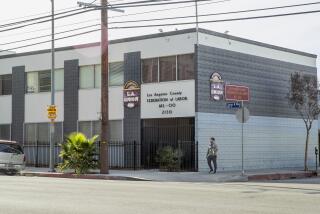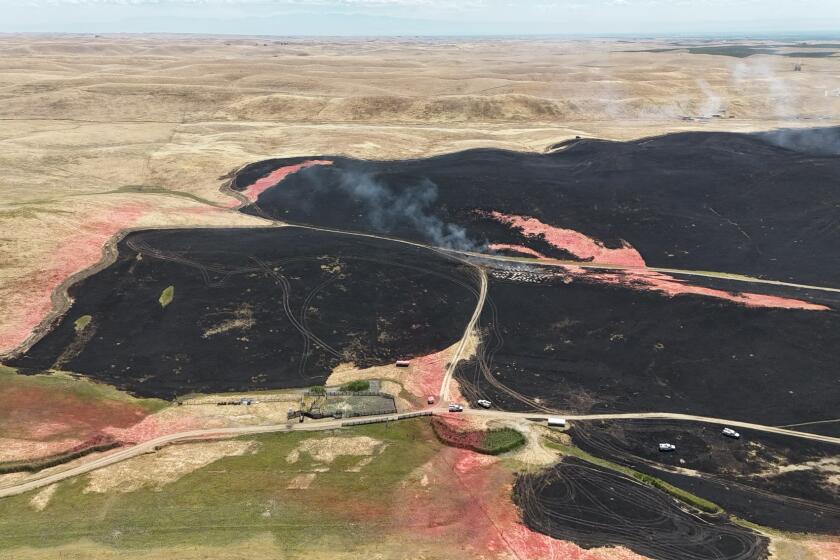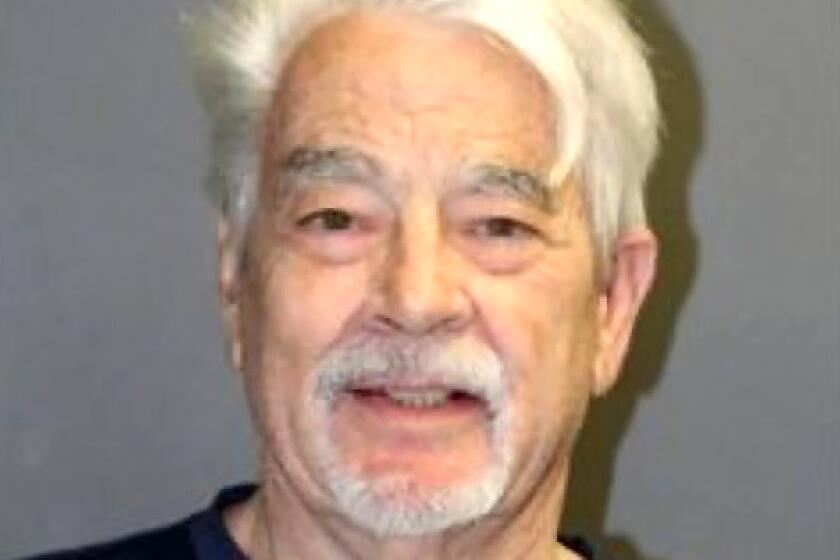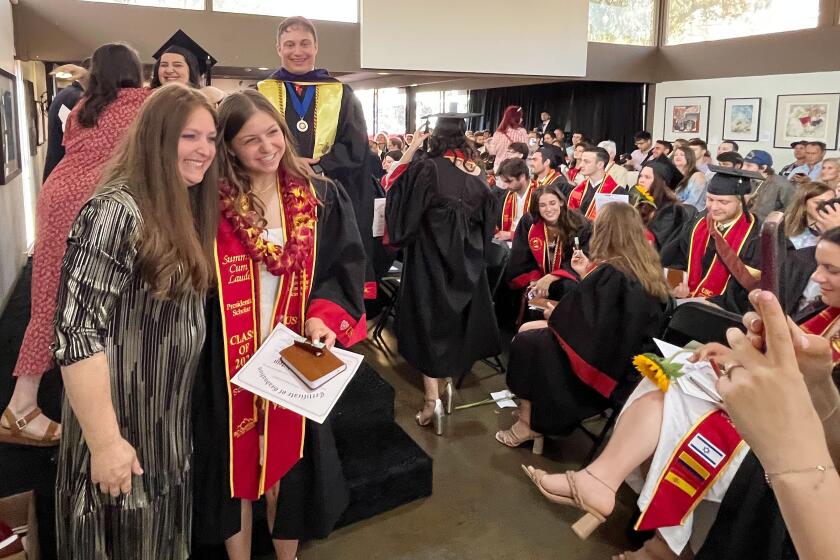Council Will Be Asked to Back Major Police Reforms
The high-level Los Angeles negotiating team working to head off a lawsuit by an increasingly exasperated U.S. Justice Department today will present the City Council with a proposal committing the city to major police reforms--including a revamping of internal investigations and the addition of new powers to the department’s civilian overseers.
According to people who are participating in the negotiations--marked in recent weeks by deep divisions among the members of the city team--the deal under consideration would require a vast expansion of the LAPD’s Internal Affairs Division, a major upgrade of its computerized system for tracking officers, the creation of new training programs, and a bolstered civilian leadership for auditing and publicly reporting on the Police Department’s performance.
The City Council also ultimately may require--as federal authorities have demanded--that the reform package include a provision that LAPD officers, for the first time, begin collecting data to determine whether there is evidence that police engage in racial profiling. And although council members are not expected to debate it today, key city officials are weighing possible charter amendments that would turn posts on the civilian Police Commission from part-time into full-time jobs and that would change the rules governing some aspects of the LAPD’s system for disciplining officers.
As those officials wade through the package of proposed reforms, they will write the next chapter in Los Angeles’ most enduring modern political tale--the quest to impose meaningful civilian oversight on the city’s police. It is a story whose prologue was drafted after the 1965 Watts riots, but whose real beginning is in 1991, the year that Los Angeles police officers beat Rodney King into submission, prompting the city to ask an independent commission of lawyers under the leadership of future Secretary of State Warren Christopher to dissect the LAPD and draft a blueprint to remake it.
New Constraints on Assignments
Today, Christopher is among those who express some disappointment that the reforms recommended that year remain unfinished.
“Over the past 10 years, the independent commission’s recommendations for molding the LAPD into an organization with its professional and civilian arms in balance have been translated, principally by charter amendments, into something like an architectural rendering,” Christopher said last week, breaking his customary silence on the topic. “What has lagged behind is the implementation of the architectural plans. We have yet to see the concrete steps--such as full and adequate staffing for the Police Commission and inspector general, a computer system to track officer conduct and regular psychological testing of personnel--that are critical to completing the process.”
Christopher emphasizes that he is not taking a position in the current talks--he has spent recent months traveling and helping Vice President Al Gore come up with Connecticut Sen. Joseph I. Lieberman as his vice presidential nominee, not monitoring negotiations over police reform in Los Angeles.
Together, those changes could be costly and controversial: They would impose new constraints on the way the LAPD assigns its officers, and they are sure to require the ongoing oversight of an independent monitor, who would operate under the supervision of a federal judge. Police Chief Bernard C. Parks has signaled his unhappiness with some of those proposals, as has Mayor Richard Riordan. Riordan’s view is particularly critical because the mayor could choose to veto a deal approved by the council, though that could be overridden by a two-thirds vote of the city legislative body.
What’s more, even if the council adopts the package with Riordan’s approval or over his veto, it may or may not satisfy federal officials, who have grown so irritated by what they perceive as the city’s foot-dragging that they recently contemplated sending Los Angeles officials a letter accusing them of negotiating in bad faith. They agreed to hold off only after City Atty. James K. Hahn asked for time to try to forge a united city position that could win the support of a majority of the City Council.
The goal of police reform advocates has always been the same--to make the LAPD more accountable to civilians. But while there already have been significant changes, most notably the imposition of a term limit for the police chief and the creation of an inspector general for the Police Commission, the LAPD today remains a strikingly insular organization, its operations far more shielded from public view and its leaders far more protected from political give and take than those of most major law enforcement agencies.
“We realize that we didn’t finish the job on police reform,” Hahn, the city’s lead negotiator, said last week. “We’re motivated now to finish what we’ve begun.”
In fact, five years after the 1991 Christopher Commission report, a follow-up study by lawyers Merrick Bobb and Mark Epstein--both of whom served as staff counsel to the Christopher Commission--examined the LAPD and found the results unsatisfactory.
“We conclude that the department has not undergone reform to the extent that was possible or required,” they wrote.
Four years after that, some of the Christopher Commission’s most notable recommendations still remain incomplete or worse. Long-discussed areas such as psychological testing, personnel evaluations, training and discipline remain on the table. Meanwhile, new topics have arisen in the years since the Christopher recommendations.
Today, city leaders are debating whether it is appropriate for LAPD officers to record the ethnicity of people stopped for traffic offenses or as pedestrians. Many police agencies already gather that data, but Riordan and Parks, among others, question whether the LAPD should.
Within the Police Department, struggles are escalating almost daily over the appropriate scope and authority of the inspector general, whose office was a long-delayed creation of the Christopher Commission. Parks and his top staff see Inspector General Jeff Eglash as primarily an auditor, charged with reviewing the LAPD’s performance in the area of discipline and issuing periodic reports.
Eglash and some supporters see the job far differently. They argue that to be effective, the inspector general needs the power to investigate claims of wrongdoing and to conduct his own inquiries--especially in cases where the LAPD’s own systems are being questioned.
Those are not academic differences. They play out every day at the LAPD, with police investigators occasionally seeking to interview Eglash’s staff about their contacts with potential witnesses. In some instances, the LAPD has asked the inspector general to turn over envelopes containing complaints so that they can be tested for fingerprints.
Faced with such continuing controversies over the role that civilians should play in overseeing and controlling the city’s police, some of those who served with Christopher on his 1991 panel acknowledge that there is much left to do.
“It’s a work in progress,” said U.S. Circuit Judge Raymond Fisher, who served on the Christopher Commission, then as president of the Police Commission and later at the U.S. Department of Justice. “It’s been made more difficult by all of the negatives the department’s had.”
Disagreement on Deal’s Terms
For those reform advocates, the current negotiations with the Justice Department offer one more chance. This time, the enforcement mechanism is not the public’s goodwill nor the power of city voters to change the charter. It’s the federal government, acting under the threat of a lawsuit and demanding that a judge be given the power to oversee any reforms.
“This situation is different, both in terms of the reasons for the negotiations and the potential for enforcement by the federal courts,” Police Commission President Gerald L. Chaleff said. “This is a great opportunity for Los Angeles to decide what type of reform it really wants, if any.”
Most observers believe that a deal can and will be struck. But they profoundly disagree about what it might say. Led by Hahn, the city’s negotiating team includes Chaleff, Riordan Chief of Staff Kelly Martin and Chief Legislative Analyst Ron Deaton. LAPD Deputy Chief Martin Pomeroy also is active in the negotiating sessions, participants say. Sources close to the talks say Martin and Pomeroy generally have appeared the most skeptical of the Justice Department’s recommendations for reform, while Hahn and to a lesser extent Chaleff have appeared the most amenable.
“We really need to commit to significant reform,” Hahn said. “Obviously, though, the devil’s in the details.”
Timing also is crucial. The negotiating team is taking its work to the council today partly because the council is due to recess for two weeks in late August. Before council members leave, negotiators would like to have a solid sense of their wishes so that they can sit down again with the Justice Department at the end of the month.
On Washington’s side of the table, patience is wearing thin. And the federal officials are conscious of the ticking political clock.
Texas Gov. George W. Bush, the Republican presidential nominee, has publicly indicated that he believes police matters are best handled locally, raising serious questions about how the Justice Department’s Civil Rights Division would handle this case if he is elected. That has given added urgency to the negotiations, as federal officials would like to strike a deal this fall rather than risk having their mandate change next year, when a new president takes office.
That has left the Justice Department team with little patience for the city’s struggles to come to a unified position in the talks. So brittle were the talks last month that they ended with federal authorities warning that they were on the verge of accusing the city of negotiating in bad faith and setting a deadline to present the Justice Department with a formal response to its 103-page proposed consent decree.
Participants in the talks will not comment on that moment, but Hahn indirectly appeared to confirm it by saying he urged the Justice Department not to upset the apple cart.
“I did think it would be a bad idea in the middle of this process to do anything to give aid and comfort to those who don’t want to see an agreement,” Hahn said. “I personally assured them . . . that as far as our office is concerned, we are taking this matter seriously.
“We can’t put our heads in the sand and say we haven’t had a problem in Los Angeles,” Hahn said. “Now is our chance to come up with something that is meaningful and that is real.”
More to Read
Start your day right
Sign up for Essential California for news, features and recommendations from the L.A. Times and beyond in your inbox six days a week.
You may occasionally receive promotional content from the Los Angeles Times.







